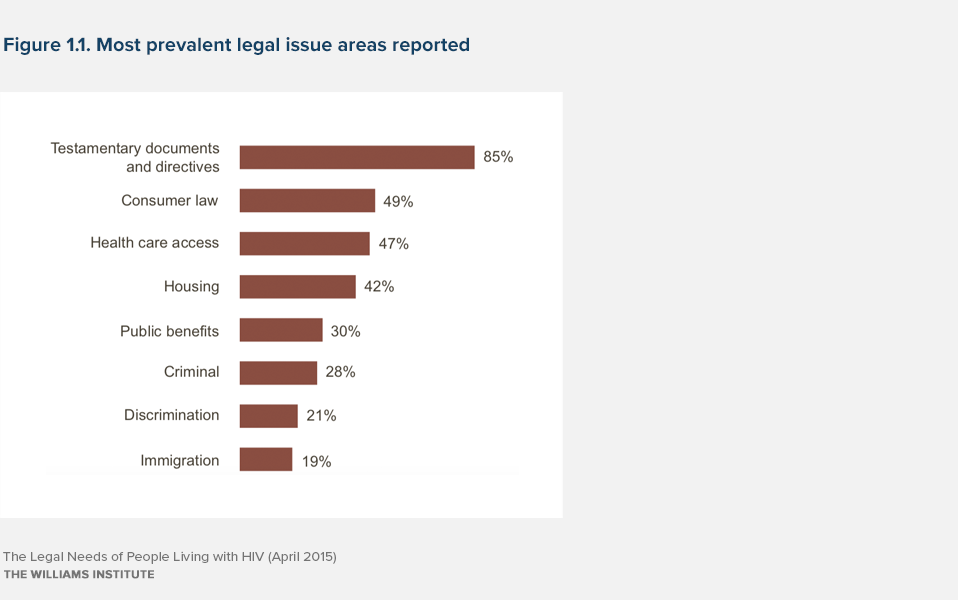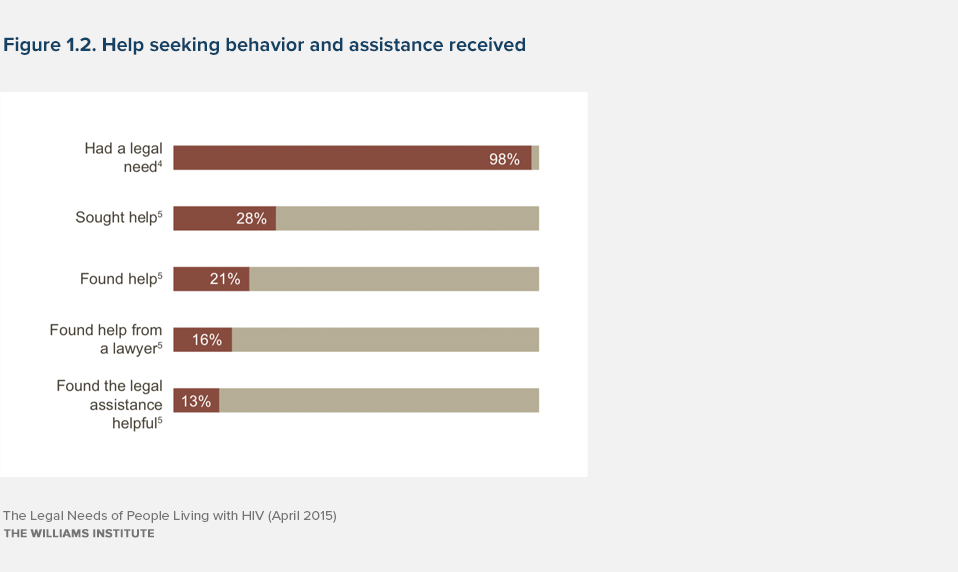Executive Summary
Introduction
Los Angeles County (“LAC”) is home to the second-largest community of people living with HIV/AIDS (“PLWH”) in the U.S. Currently, an estimated 58,000 PLWH reside in the county, a figure that has steadily increased over time. In 2013, the Williams Institute designed the Legal Assessment of Needs Study (“LeAN Study”) to examine the legal needs of PLWH in LAC. The study focused on particularly vulnerable members of the HIV-positive community, including low-income and unemployed individuals. Almost all respondents were accessing community-based social services and safety net programs at the time of the study.
Research studies focused on legal services for PLWH are limited. Needs assessments in other jurisdictions have been broad and focused on a variety of service categories, including legal services. The most recent legal needs assessment focused on PLWH in LAC was completed in 1998, over 15 years prior to this study. Since that time, the medical and legal frameworks in addition to funding sources for HIV legal services have changed drastically. In May 2012, LAC’s legal services provider dedicated solely to PLWH, the HIV & AIDS Legal Services Alliance, closed its doors. This closure raised questions about whether the changing medical and legal landscape for PLWH in LAC had reduced HIV-specific legal needs and whether such legal needs were being met by other legal services providers. This study was designed to answer these questions.
Legal Assessment of Needs (“LeAN”) Survey
This report summarizes findings of the LeAN Study – an online survey with 387 respondents who identified as PLWH. We describe respondents’ legal needs, respondents’ experiences getting assistance for identified legal needs from both legal and non-legal sources, and barriers respondents faced in accessing assistance from both legal and non-legal sources. We describe differences and similarities among subpopulations that are traditionally underserved and understudied, including gay and bisexual men (“GBM”), people of color, and cisgender and transgender women. Finally, we discuss how these legal needs may relate to health access and health status.
Main Findings
- Almost all respondents had a legal need.
- Ninety-eight percent of respondents reported they had a legal need in the year prior to the survey.
- Almost all of those with a legal need said that they did not have a testamentary will and/or an advanced health care directive.
- Ninety-one percent of all respondents reported a legal need in at least one other remaining legal issue area.
- On average, respondents had more than one legal need in more than one legal issue area.
- An average of six distinct legal needs in four legal issue areas in the year prior to taking the survey was reported.
- Immigration was an area of legal need for a significant subgroup of the study sample.
-
- Nineteen percent of respondents reported a legal need in immigration law, 93% of whom identified as Hispanic, Latino, or of Spanish origin.
- Legal issues in immigration included:
- needing assistance with a green card (49%)
- citizenship (22%)
- coming into contact with Immigration and Customs Enforcement (22%)
- Gender and sexual minority statuses were a factor in some of the legal issue areas.
- Nearly half of all transgender women reported experiences of being harassed, attacked with violence, and/or subjected to another crime in the past year (44%).
- Looking at violent attacks specifically, transgender women were particularly vulnerable (29%) and were significantly more likely to report being violently attacked than straight cisgender men (7%).
- When compared to cisgender women and straight cisgender men, gay and bisexual men were significantly more likely to report being harassed, attacked with violence, and/or subjected to another crime in the past year (41%).
- Transgender women were significantly more likely to report having been incarcerated in the five years prior to the survey than cisgender women (26% versus 12%, respectively).
- HIV-related discrimination was reported by participants in several areas.
- In the five years prior to the survey, 31% of respondents reported experiencing HIV-based discrimination in housing, employment, and/or health care settings.
- Among those who reported being incarcerated for a week or more during the five-year period prior to the survey, 56% reported having problems accessing HIV medication, being separated from others due to HIV status, and/or being denied access to services in the jail or prison while incarcerated.
- Affordability and awareness of legal services was a barrier to getting legal assistance.
- Among the 71% of respondents who had a legal need and did not look for legal assistance, 26%indicated they did not seek help because they could not afford legal services, and 15% indicated not knowing who or where to call.
- Respondents reported impacts on their lives from not receiving legal assistance.
- Respondents described the impact of their most recent legal need, including difficulty carrying on normal life (70%), stress-related illness (59%), physical ill-health (25%), difficulty keeping medical appointments (19%), difficulty taking medications (17%), and loss of income or financial difficulty (19%).
Policy, Practice, and Research Implications
- It appears that low-income PLWH have numerous legal needs and in a broad range of legal issue areas. Thus, addressing all legal needs of PLWH would require significant resources. Given the relative scarcity of funding for legal services, these findings provide a list of commonly experienced issues that could be used by providers serving PLWH to prioritize areas of legal practice (e.g. testamentary documents and directives, consumer law, health care access, and housing).
- Given that immigration law is an area of high need among Latinos, legal services providers may consider prioritizing legal resources for immigration law in order to fully serve the legal needs of Latino PLWH.
- Transgender women and GBM represent especially vulnerable communities with specific legal needs in areas of physical victimization and criminal law. Legal service providers may want to consider implementing targeted programming to address the needs of this population.
- It appears that many PLWH in LAC continue to face HIV-related stigma and experience HIV-based discrimination in different aspects of daily life. To bolster existing HIV non-discrimination law, steps taken to reduce stigma and discrimination may include providing continuing education on HIV/AIDS issues and law to service providers who serve PLWH in these contexts (e.g. health care providers, housing providers, employers, corrections officers, legal services providers and law enforcement officers). Further, research on best practices for delivering culturally competent legal services would be a useful next step for the field.
- The majority of respondents did not seek legal assistance, and this was, in part, because they did not know if a lawyer could help them. The findings indicate that educating PLWH about how to identify a legal need would, in part, address this particular gap. Further, the study shows that vulnerable PLWH in LAC need more information on the availability of legal resources that are low to no cost. Increased outreach about available resources could influence help-seeking behavior among PLWH with legal needs.
- Finally, these self-reported impacts resulting from legal needs indicate more research is necessary to explore the relationship between the presence of legal needs and its impact on the health of PLWH.
Methodology
From July through October 2014, in-person computerized surveys were administered in conjunction with AIDS Project Los Angeles’ community-based food pantry program, Bienestar, and other HIV service providers throughout LAC. The final data set includes 387 total complete surveys of which 21% were completed in Spanish.
To be eligible to take the survey, a respondent had to consent to the study, be 18 years of age or older, living with HIV, and reside in LAC at the time of the survey. Respondents were asked to complete a series of questions focused on: demographic information, a legal needs evaluation, questions about health coverage, current health and wellbeing, knowledge about California laws related to HIV/AIDS, and experiences with discrimination, privacy, and confidentiality of HIV status. Respondents who completed the survey received a $5 incentive. Study procedures were approved by the UCLA Institutional Review Board.
Download the full report

